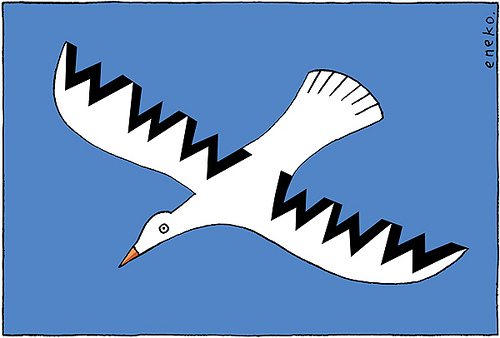On April 4, the law “which regulates liability for infringement of copyright and related rights on the Internet,” called “Law Lleras [es],” was presented before the Congress of Colombia. This law seeks to be consistent with the obligations for the possible acquisition of a free trade agreement with the United States. The name of the law is in honor of its creator [es], the Minister of Interior and Justice, Germán Vargas Lleras.
Roberto Andrés Díaz, in his blog Maestro de la computación [es], explains how this law could affect the user:
[…] con este proyecto se podría penalizar incluso con cárcel a todos aquellos que usemos Internet para compartir o descargar música, películas, programas, libros, artículos, etc. sin pagar los derechos de autor con animo de lucro. También sancionará a los proveedores de servicio (ETB, Telefónica, Telmex, EPM, UNE, COMCEL, TIGO, Movistar, Etc…) que faciliten la “piratería” o copia ilegal de dichos contenidos, lo que obligará a estas empresas a bloquear paginas, puertos de programas P2P, suspender el acceso a usuarios y hasta darnos de baja del servicio.
This has raised concerns in thousands of netizens who have reacted on social networks.
The daily El Tiempo points out the protagonists from both sides of the debate:
[…] por un lado, están los defensores del software libre y, por el otro, los autores de contenidos, cantantes, directores de cine y empresarios, que piden una lucha sin cuartel contra la piratería en la red.
The new site Recrea [es] defends the project, and among other things, says:
Re-Crea considera que la coyuntura creada por la presentación del Proyecto de Ley, mejor conocido como “LEY LLERAS”, es una oportunidad única para sentar las bases de lo que será el respeto por una sociedad digital libre, por el libre intercambio de ideas y por la creación cultural, fruto de un dialogo colectivo en Colombia.
In his blog [es], Luis Ángel Pérez tells readers to prepare for the law; while Sergio Augusto Ovalle, in his blog Continental Cyberlaw [es], proposes a way to face these new copyright challenges realistically:
Los amantes de la libre cultura que promulgan el nuevo paradigma de la libre difusión de la cultura y la información, han ideado mecanismos como las licencias libres de “Creative Commons” por medio de las cuales yo decido que se puede hacer con mi obra, eliminando el intermediario que gestiona mis derechos de autor, y así siendo mas consecuente con los fans, o con los usuarios que se benefician a nivel personal con las creaciones intelectuales.
In equinoXio [es], Carolina Botero [es] raises the concern that internet is a means and not an end. She also writes about the bill's procedures that are inconsistent with existing laws of the country:
La obligación que se impone a los proveedores de servicio de Internet de establecer un esquema contractual para desconectar a los infractores reincidentes choca también con la idea de que el único facultado para esto es el juez […]
In Alt1040 [es], Global Voices author Geraldine Juárez expressed her disagreement and argued that,
La piratería —como la gente con una visión muy reducida de como funciona la circulación cultural en este siglo—, no se arregla con leyes para perseguir a piratas, se arregla ajustando los precios, así como los modelos de producción y distribución. No hay evidencia de que las descargas afecten el monopolio cultura, al contrario.
Carlos Armando Cuervo, in his blog Pulso de Opinión [es], says he disagrees with the writing and design of the bill:
Estamos asistiendo desde hace dos días a un nuevo episodio de arrogancia legal y confusión conceptual en la redacción y presentación de la nueva ley que “regula la responsabilidad por las infracciones al derecho de autor y los derechos anexos en internet.”
On Facebook users have created pages and accounts against the law; while on Twitter users manifest a number of complaints and report cyber-attacks on Law Lleras and government [es] websites.
Anonymous Colombia (@Anonymous_Co) warns:
Señores @Gobiernoenlinea van a tener mas “inconvenientes técnicos” en las próximas horas, gracias. ;) #leylleras #opcolombia
Users @Juankof and Alex (@0Driver) report on online attacks:
@Gobiernoenlinea –>DOWn , cuales problemas técnicos lo que tienen es la #marcha2.0 en contra de la #leylleras #opcolombia
Electronic engineer Carlos E. Velazquez V (@cevelasquezv) relates the law to similar regulations like law Sinde from Spain, the Anti-Counterfeiting Trade Agreement (ACTA) and the Digital Millennium Copyright Act (DMCA):
Ley Lleras? Ley Sinde? ACTA? DMCA? acordadas en los TLC? No protegen los derechos de autor, ni promueven la creatividad #leylleras
Finally, Carlos Felipe Isaza (@cuimbo) makes a sarcastic reference to impunity with the death of people like Jaime Garzón and Orlando Sierra:
En Colombia siempre han protegido los derechos de los autores; los autores intelectuales #leylleras #impunidad #jaimegarzon #orlandosierra








3 comments